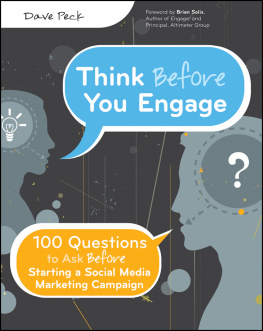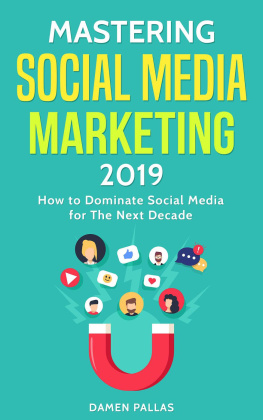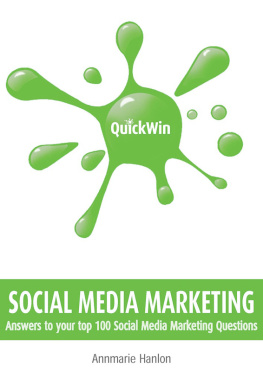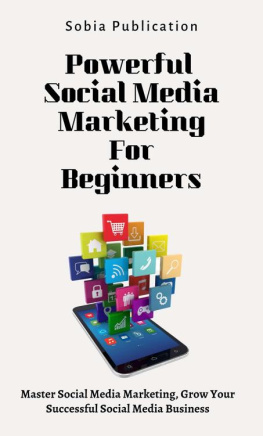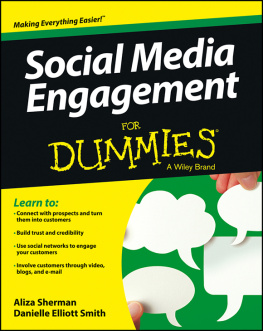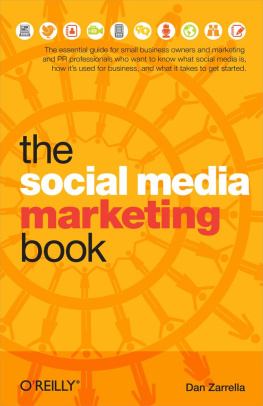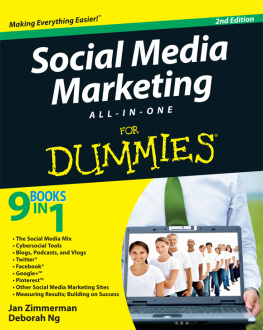Chapter 1
Planning a Brand
In this chapter:
- 1. Why do I need to establish a brand?
- 2. Brand, online presencewhats the difference?
- 3. What are some successful brands?
- 4. How do I develop my brand strategy?
- 5. What is my brands objective?
- 6. Who is my target audience?
- 7. Am I reflecting my brand?

1. Why Do I Need to Establish a Brand?
In this day of everyone wanting to be the next expert, thought leader, and YouTube star, creating a personal brand is more important than ever. Now, before you take a deep-breath sigh thinking, Where do I begin with this? or It sounds like too much work, you need to realize that you probably already have one!
Put this book down and go to your computer. Go to Google and type in your name and city. If you have a website or a LinkedIn, Facebook, YouTube, or Twitter account, it will come up in the search. Amazing, right? All this information about you or your brand is already out there on the Internet. It is nearly impossible to get it taken off, deleted, or removed. What you can do is take control and manage your personal brand, making it so people can find and learn the things about you that you want them to know.
Establishing your brand online is a necessary step in your overall marketing plan. More than ever, people find themselves online looking for information or entertainment. Whether the brand represents large corporations, startups, or individuals, it acts as a voice or personification of that business.
In social media, a brand is more important than ever. Without a developed brand, companies and individuals would have no focus in their marketing outreach. People wouldnt connect with companies because they wouldnt find a common ground, and return on investment in social media would be minimal. Social media services and sites are readily available for brands to have online support for many different functions, including video, networking, accounting, and more.

When first starting to develop your brand, start with your logo tagline and mission statement to generate ideas for your strategy.
A brand is more than a name. A name may identify a company or individual, but it doesnt actually hold any meaning for the consumer. The brand (or personality) is what helps people to understand what the company is all about. Some of the many social networking sites available for brands include Facebook, LinkedIn, StumbleUpon It!, Yahoo!, Twitter, YouTube, and so on.

Related Questions
- 12. What social networks best fit my goals? Page 40
- 75. How can social media websites make this easier? Page 212
- 77. Why does what I do in the real world matter? Page 216

Rule of Thumb
In social media, personality is the key to success. If you have to use your business name as your brand name online, be sure to add a human touch by letting people know who it is that is speaking on behalf of the company.
Action Item
- If you do show up on a Google search, write down what page your information is listed on in the search results, and note the order in which your information is listed. Knowing your Google search ranking is useful when you work on improving your website presence so that you have a baseline to start.

2. Brand or Online PresenceWhats the Difference?
Determining the answer to What is a brand? can be a tough question to ask. Many companies cannot seem to answer the question in a straightforward manner.
Walter Landor, well known in the advertising industry, said, Simply put, a brand is a promise. By identifying and authenticating a product or service, it delivers a pledge of satisfaction and quality.
Walter summed it up nicely, but today it can mean so much more. Today, it can be also seen as A collection of perceptions in the mind of the consumer. This is exactly what you want to create online.
In March 2010, I spoke at the South by Southwest (SXSW) Interactive Conference in Austin, Texas. The topic was How to Score a Job using social networking. The room was full of job recruiters. They shared that they put a heavy emphasis on applicants online presence. By online presence, I am essentially referring to how active one is on the Web with personal websites, blogs, published articles, activities on programming forums, and so on. One recruiter went as far as to say that, when hiring for technical positions, he would ignore applicants who although fully qualified, lacked the online presence that someone with their skills should have. If youre a Ruby on Rails programmer, theres no better way to show your passion for the framework than by blogging about it, publishing tips and guides, or simply helping others work with it. Companies can easily see that, which definitely helps during the interviewing and selection process.
Alternatively, having an online presence can pose a negative. People often find false comfort in privacy and security settings for the various networks, and post content that can reflect negatively on a brand. Putting up pictures of the nights drunken escapades or venting about a coworker may not bode well for business the next day. Online presence is simply the act of being online. By having ways for people to search and find you online, you establish a presence.

SXSW is a series of films, interactive festivals, music festivals, and conferences that take place every spring in Austin, Texas.

Related Questions
- 4. How do I develop my brand strategy? Page 13
- 7. Am I reflecting my brand? Page 22
- 10. How do I brand my online identity? Page 34
- 76. Do I still need a business card? Page 214
Action Items
- Visit every site on which your brand has a presence and clean up any content that may be deemed negative or controversial by others (unless you want the controversial image).
- Immediately after setting up your profile on a social network, visit the privacy settings and customize them to what works best for your needs.

3. What Are Some Successful Brands?
Regardless of whether you are a person, a small business, or a big business, you have one thing in common: youre a brand. You want your brand to be successful and well known. This section looks at what some big brands have done to expand their online presence using social media.
Starbucks
Starbucks coffee chain (see ) likes to post what it calls freshly brewed tweets to its Twitter following of more than 1.3 million. If you look at the number of tweets that this brand does, you might notice a certain trend. What you see is a large number of engaging replies and mentions to its community almost every day. Starbucks has a strong reputation for being engaging and talking to people on Twitter. It doesnt just sell coffee.

